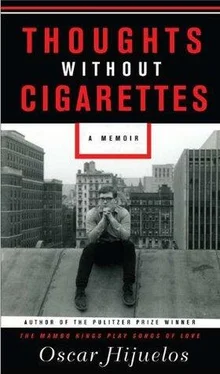Physically, they were practically twins. Each possessed a longish face; broad ridged forehead; large, slightly hooked nose; and protuberant, fleshy ears. Quite fair in complexion, even ruddy, they had wavy dark hair, deeply set dark eyes, and sad expressions of a distinctly Arabic or Semitic cast. It’s likely that some distant Jewish blood flowed through their campesino veins. Just the same, close as they may have been, while Oscar, as a patriarch in waiting, looked after the family’s livelihood, my father spent his time hanging around the arcades and street corners of town, doffing his hat at female passersby or else consorting with friends, with whom, on the weekends, he frequented the dance halls. Over this his older brother must have frowned. But there was something else as well. Leaving the farmwork to his older brother, my father grew quite attached to his sisters, particularly the eldest, Maya.

One day, Magdalena brought her new suitor home, to their small flat along la calle Miró, and from the start, Pascual made a good impression on her family. My aunt Cheo, her younger sister, would remember my father from those days as “a quiet fellow” with a certain humble but dignified bearing, that he sometimes came riding down their street on a horse, often with a bouquet of flowers in hand. He seems to have gotten along very well with my religious maternal grandmother, María, as well, though I can’t imagine his ever once accompanying her to church, where she, like my mother, took refuge from the sorrows of this world — he just wasn’t that way.
While their time in Magdalena’s home passed quietly, her visits with Pascual’s family would have been far more socially busy, especially on the weekends when they hosted parties, neighbors and relatives coming from all around to their farm on the outskirts of Jiguaní. On such occasions, she got to know his beloved older brother, Oscar, who, she would swear, always liked her, as did their papi , Leocadio, an enormously tall, barrel-chested man known for his bodily strength and affectionate nature. (He would be remembered for the ease with which he could hoist up four of his children at a time and for the tenderness of his spirit; but I haven’t the faintest idea of what he looked like, as I’ve never seen a single photograph of him, though he surely must have had something of my father’s face in his own.)
The oldest family member, my father’s great-grandmother, Concepcíon Dieguez O’Connor, took in those gatherings from a rattan chair set under a banyan tree in the yard. Born in Jiguaní in 1840 of Irish and Cuban parentage, she was just short of her one hundredth year of life; the myth goes that she owed this longevity to her daily cigars and to a regimen of rum and aguardiente. She too seemed to have seen something lively and worthwhile in my mother, for Concepcíon often asked her to sit by her side, regaling her with tales of her own youth. Of his seven sisters, however, it was only Maya who gave my mother a hard time. In her mid-thirties by then, and married to Pedro, she often stayed on the farm while he went traveling to the states and on tours to Europe. During his frequent absences, she apparently coveted my father’s company at my mother’s expense, and so adamantly that in the midst of those fiestas, my mother and aunt often almost came to blows — and if not, they surely had gotten to the point of insults, my mother’s favorite retort to Maya, so she would later tell me, being that, instead of Pedro, she should have married her brother. Which is to say that from the beginning, things had never been good between the two women.
Caught in the middle, my father looked the other way, and though his eldest sister no doubt attempted to break them up, the rest of the family liked my mother enough to further encourage her affections toward him. Maya, however, prayed that my mother would go away; and whenever she could, she spread her own vicious rumors about “that Torrens woman,” who had the nerve to think she was better than everyone else. Evidently, Maya’s dislike of my mother, while not enough to dissuade my father’s amorous pursuit of her, still planted enough doubts and misgivings about her character and motives to put off any immediate notions about marriage. Still, at a certain point in the early 1940s, they became engaged: As his prometida —fiancée — she doubtlessly enjoyed a boost in his family’s standing. How Maya must have suffered.
What my father could have been thinking when he, at Maya’s urgings, tore himself away from my mother, and at some point in 1942, having traveled to New York, first walked in through 419’s front doors and checked himself out in the large mirrors that, facing one another in the entryway, reflected his curious and perhaps bewildered — or excited— campesino face endlessly, is unknowable. He had arrived with money in his pockets, as Leocadio, dying the year before, had left his children an inheritance from the sales of several of their farms to divide among themselves. I like to think that Pascual, leaving my mother behind in Cuba, had made the journey sheepishly, that he missed her. Surely, he had gone to New York first and foremost as a tourist talked into keeping his sister Maya company (and perhaps she had hoped that separating Pascual from my mother would break whatever spell the Holguínera had cast over him). Nearly nightly, he and his two sisters made their way to the dance halls and ballrooms where Pedro and the orchestra performed, my father, always a sport and liking to play the big man, spending his money as if there would be no tomorrow. He bought himself some fancy clothes, sparkling cuff links, two-toned cordovans, and, if anything, had no real plans for his future. Still, as good a time as he was having, he would have hardly thought of staying in New York for long, for while he seems to have liked the city enough to prolong his visit, with the months slipping by, he had his own bouts of homesickness and surely missed my mother.
Now, although Pascual had indeed returned to marry her, sometime in 1943, it must have disillusioned her further when, finishing up some business with his brother, he left her alone in Cuba again. (But, before seeing her, he’d gone to a jewelry shop in New York City, where he’d bought her a beautiful diamond ring whose tiny stones were set in an intricately engraved gold band, a ring that she never took off, not even years later on the night when, mugged on a street near where we lived, some hoodlum threatened to cut off her finger.) Finally, after some months had passed, Pascual, having decided to give a life in that city a try, sent her the money to join him; and dutifully, with her heart in her throat — for since her father’s death, she had never ventured far from home — Magdalena made her way to Havana with a single valise, the sort of cane suitcase with soft cloth inner pockets that would sit in a closet for sixty years. She took a ferry to Miami, which was only a five- or six-hour trip, before boarding an overnight train bound for New York. Bold in so many other ways, she sat terrified, and demurely so, for most of that journey. When an American fellow, a G.I., tried to pick her up, she didn’t have the slightest idea of whatever the heck it was that he said to her; and even if she somehow had, my mother, in her ignorance of English, and as a matter of pride, dared not to speak with anyone. And there was something else: Surely dreading the fact that once she arrived Maya would be in the apartment with her, she made dozens of visits to the toilet, emptying her guts often, so tangled were her nerves. By the time she stepped off that train, her stomach in knots, she was doubtlessly relieved to find my father and Borja, the kindlier sister, waiting for her among the burgeoning Penn Station crowds.
Читать дальше













